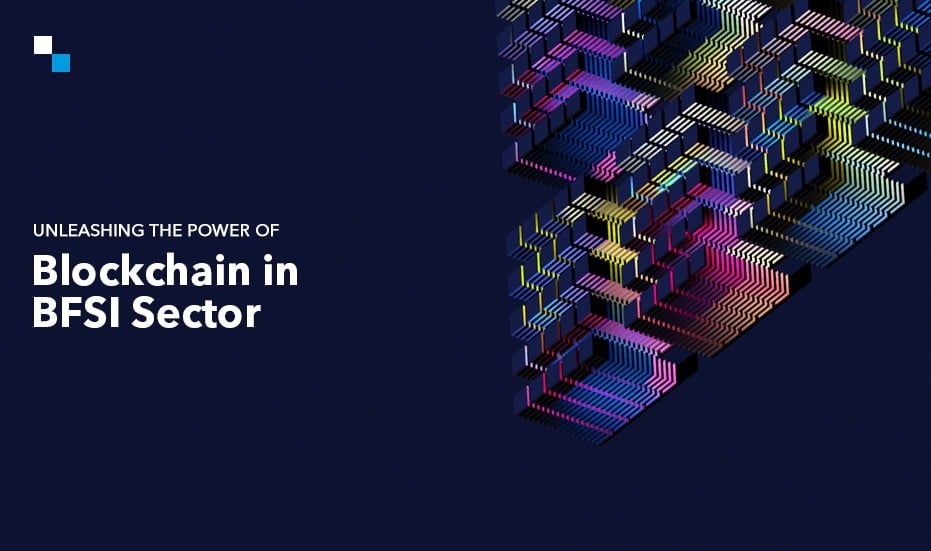
101 Guide to Successful NFT Ticketing Development
March 27, 2024
Top 5 Cost Factors to Consider When Launching a White Label Crypto Bank
March 27, 2024In the era of rapid digital transformation, relying on the traditional BFSI (Banking, Finance Services, and Insurance) system characterized by slow cross-border transactions, cumbersome manual paperwork, and persistent security threats is a cause for significant concern. It is vital to disrupt this traditional model and unlock a new era of financial innovation through the incredible potential of Blockchain. The intersection of the BFSI sector and blockchain sparks a revolution that promises to reshape the essence of security and transactions.
The research also highlights that the blockchain in BFSI market size is estimated to reach $22.46 billion by 2026, whereas its value was $277.1 million in 2018. The market would grow at a CAGR of 73.8% from 2019 to 2026.
Additionally, several global leaders in the BFSI sector, including Goldman Sachs and JP Morgan reap the full benefits of blockchain technology to reach the next level of innovation. In this blog, we will delve into how blockchain in finance and overall BFSI are considered the next big thing.
The Transformative Role of Blockchain in Addressing Challenges in the BFSI Sector
1. Regulatory Compliance
Challenge: BFSI organizations grapple with navigating complex and evolving regulatory frameworks, which often result in significant compliance costs and operational burdens.
Solution: Blockchain’s immutable and transparent nature enables real-time monitoring and auditing of transactions, which streamlines regulatory compliance efforts. Smart contracts can automate compliance processes, ensuring adherence to regulatory requirements while reducing administrative overhead.
2. Slow Transaction Settlements
Challenge: Traditional financial transactions often involve lengthy settlement times due to the involvement of intermediaries and manual processing, which results in delays and increased costs.
Solution: Blockchain eliminates the need for intermediaries as it facilitates peer-to-peer transactions with near-instantaneous settlement times. Smart contracts execute predefined terms automatically. It enables swift and secure transactions across borders, thereby reducing settlement times and operational costs.
3. Data Security and Privacy
Challenge: The BFSI sector faces constant threats of cyberattacks and data breaches, jeopardizing sensitive customer information and eroding trust.
Solution: Blockchain’s decentralized and cryptographic principles ensure data integrity and security. It stores data across a distributed network of nodes and employs cryptographic hashing techniques, which play a pivotal role in mitigating the risk of unauthorized access and tampering. Moreover, permissioned blockchains enable fine-grained access control, safeguarding sensitive financial data while maintaining privacy.
4. Cost Inefficiencies
Challenge: Traditional banking and financial systems are plagued by inefficiencies stemming from manual processes, legacy infrastructure, and high transaction costs.
Solution: Blockchain technology streamlines processes and reduces costs by eliminating intermediaries, automating reconciliation, and optimizing resource utilization. Smart contracts automate routine tasks, such as loan processing and insurance claims settlement, thereby reducing operational overhead and enhancing cost efficiency.

5. Fraud Prevention
Challenge: The BFSI sector grapples with the prevalence of fraud and financial crimes that can have negative consequences in the form of financial losses and reputational damage.
Solution: Blockchain’s transparency and immutability enable enhanced fraud detection and prevention. As transactions on the blockchain are recorded on a tamper-proof ledger, it provides a transparent audit trail that facilitates the detection of suspicious activities in real time. Additionally, digital identities and cryptographic signatures enhance authentication and reduce the risk of identity theft.
6. Financial Inclusion
Challenge: Many individuals and businesses, especially in underserved regions, lack access to traditional banking services, hindering their participation in the global economy.
Solution: Blockchain technology enables the creation of decentralized financial services and digital assets, fostering greater financial inclusion. Through blockchain-based platforms, individuals can access banking services, obtain micro-loans, and participate in peer-to-peer lending without relying on traditional financial intermediaries. Moreover, blockchain facilitates cross-border remittances at lower costs, empowering individuals to securely transfer funds across borders.
Key Players in the BFSI Sector Leveraging Blockchain Technology
- JPMorgan Chase & Co.: J.P. Morgan is the first global bank that offers a blockchain-based platform for seamless wholesale payment transactions. Onyx by JP Morgan re-architects the way money, assets, and information move worldwide.
- Santander: The global Santander bank has been using blockchain technology to tokenize agricultural commodities and issue bonds with a blockchain foundation. Santander is also popular for its close collaboration with a leading crypto firm, Ripple.
- HSBC: HSBC (Hong Kong and Shanghai Banking Corporation Limited) is another key player in the BFSI sector that is also involved in blockchain initiatives aimed at improving various aspects of banking operations. They have explored the use of blockchain for trade finance, supply chain management, and cross-border payments.
- Swedish Central Bank: The Swedish Central Bank, also known as Sveriges Riksbank, has indeed been researching the possibility of issuing a digital currency called the e-krona. It’s a Corda blockchain-based CBDC. and a two-tier and private blockchain-based model.
Conclusion
In conclusion, blockchain is a transformative technology that plays a vital role in addressing long-standing challenges of the BFSI sector and unlocking new opportunities for innovation and efficiency. Leveraging blockchain’s decentralized, secure, and transparent infrastructure can help BFSI organizations reap several benefits. If you’re planning to unleash the potential of Blockchain for your BFSI business growth, collaborate with a reliable blockchain development company, Antier. Developers at our company have extensive experience in utilizing the power of blockchain in finance and the BFSI sector. We have worked with numerous clients across the globe and if you’re looking for expert assistance for your project, connect with our team today!



